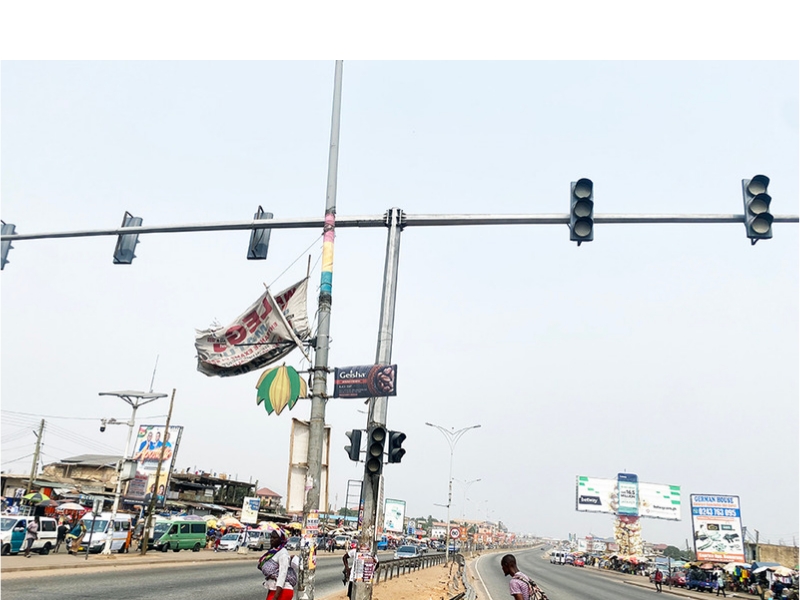
Traffic lights at the Lapaz-Nii Boi intersection on the N1 have been out for over a month now, a situation that is posing a serious danger to pedestrians.
These pedestrians, at the peril of their lives, struggle to cross the ever-busy highway that leads to the Central Region and the Tema-Accra motorway through the Tetteh Quarshie interchange.
The Chronicle has monitored the dysfunctional traffic lights for some time now, and how people, young and old, manage to cross to the other side.
This paper observed that these pedestrians, as an alternative to the dead traffic light, watch to see that there are no vehicles coming or that the vehicles are not close, then they sprint across.
Though this paper did not witness any accidents throughout the days it monitored the traffic lights, it saw how drivers had to swiftly apply their brakes, and pedestrians increasing their steps to escape a knock by vehicles.
Otherwise, one musters the courage to step under the spoilt traffic light on the side heading toward Nyamekye to wave to oncoming vehicle to stop so massed up pedestrians could cross.
Coming from Dzorwulu or Achimota, people familiar with Lapaz could attest to the busy nature of the N1. Thousands of vehicles and pedestrians use the road each day.

If one wanted to know how important that set of traffic lights are to pedestrians, The Chronicle observed that pedestrians do not have even ten seconds to cross the road to either the Tema station at Lapaz or from there to Nii-Boi.
People who intend to cross from Nii-Boi stand the highest risk as compared to those doing the same from the Lapaz station.
Those from the Lapaz station heading towards Nii-Boi are saved by the traffic closer to Las Palmas and Ecobank.
When that light is on red from Nyamekye to the Apenkwa Interchange, the road becomes empty when standing at the Tema station side. This makes it easier and safer for pedestrians even when the traffic light is still not working.
ABOUT THE N1 HIGHWAY
The N1 or National Highway 1 is a highway in Ghana that begins at the border with Ivory Coast at Elubo and runs through Sekondi-Takoradi, Cape Coast, Winneba, Accra and Tema to the border with Togo at Aflao. It is the main highway along the coast of the country, with a total distance of 540 kilometres.
ROAD SAFETY COMMISSION
In an interview with Joy News last month, the National Road Safety Authority (NRSA) blamed Urban Roads Department solely for the widespread dysfunction of traffic lights in the nation’s urban centers and the crashes that result from them.
The blame followed data from the Authority which indicated that 48 percent of traffic lights across Ghana were dysfunctional as of June 2022.
Greater Accra leads with 33 dysfunctional traffic lights, followed closely by the Ashanti Region with a count of 24. The rest are: Bono East-10, Western Region–9, Bono–7, Volta Region–5, Eastern Region–3, and Upper East–3.
According to the Director of Regulations, Impact, and Compliance at the National Road Safety Authority, Kwame Koduah Atuahene, Urban Roads had not demonstrated enough commitment to solving it, thus the problem persisting.
ABOUT THE TRAFFIC LIGHT SYSTEM PROJECT
The $236.10 million Accra Intelligence Traffic Light System (AITMS) project, initiated in 2012, was to remove the city’s traffic congestion and regular gridlock during peak traffic hours while also lowering air pollution.
As part of the project, street lights with solar-power backups were to be deployed along 200km of roads to provide night time safety and urban renewal, while 182 intelligent traffic signals will be installed and coordinated under this project.
The AITMS include an intelligent traffic violation monitoring system, which would use advanced image recognition, motion detection, and vehicle license plate recognition technologies to lower speeding, red-light, and parking violations.








